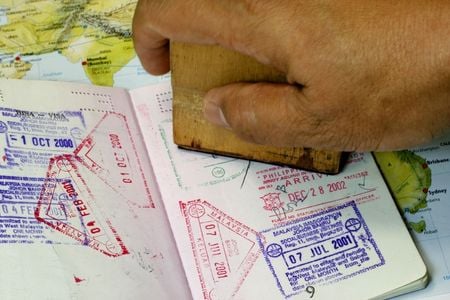
Visa
MANILA, Philippines — The long line of visa applicants at the United States Embassy in Manila on Thursday morning captured only a fraction of the many Filipinos who will roll the dice for a chance to set foot in the US, whether permanent or temporary.
But myths still hound the process of securing a US visa in the Philippines, making it seem like an arduous, sometimes impossible goal.
US Embassy Consul General Mark McGovern debunked a string of misconceptions that often mislead US visa applicants.
“There is no magic bullet or a magic list of things that people need to acquire for the visa. It’s based on the individual circumstances of the applicant,” he said in a news conference.
McGovern, however, revealed a few tips that “work a hundred percent of the time.”
“Number one, always tell the truth. We can often tell really quickly when people are not being truthful to us about their intentions or what they want to do when they travel to the United States,” he said.
McGovern pointed out that visa officers, who interview applicants on a daily basis, are able to quickly tell and read into why a person would want to travel to the US.
“If people are honest, then they’re going to be given an honest answer back. And that is the most important thing to do during the interview”
McGovern said the amount of money in a person’s bank “makes no difference” in their application.
The consul general recalled some applicants who had previously presented copies of bogus bank documents to create the impression of an optimal financial situation.
“We know somebody can put the money in there one day and take it out the next, so that’s not something we really rely on. You can usually tell. If people like that have enough money, they’re going to have a lot of stamps on their passport,” he said.
Another “telltale sign” that McGovern pointed to was coming into a visa appointment with a new passport and no travel history outside the Philippines.
“We can usually tell that pretty quickly,” he said.
No ‘magic checklist’
McGovern cautioned against trusting fraudulent agencies or businesses that promise help in visa applications.
“Don’t believe in rumors. Don’t believe there’s a checklist because none of that exists. Again, there is no magic checklist,” he reiterated.
Bank statements and land titles are not a requirement, he said, but applicants can bring them if it makes them more confident in their visa bid.
McGovern noted, however, that third-party endorsement letters from mayors, governors or any person of influence “mean nothing to the visa application.”
“People can bring documents to support them if they think that’s going to be helpful but the interviewing officer may or may not look at them. But I do know for sure that they do not take any kind of third-party endorsement. That is specifically something we train all our visa officers on. It doesn’t matter who else is writing that,” he explained.
McGovern also quashed claims that single Filipino women are more likely to have their applications rejected.
“That’s what they think. But the statistics are the same for both sexes. For all genders,” he said.
Turn to reliable information
So, who should applicants trust in their pursuit for a visa? McGovern’s obvious answer: The US Embassy.
“Rely on the official information that we have available on all our websites and use that information to understand how the visa process works,” he said.
McGovern repeatedly said it will all come down to individual circumstances.
In particular, he listed few of the crucial things they will be looking at when reviewing a visa application:
- Length of stay in the US
- Current profession
- Travel history
- Plans in the US
- Education background
- Relatives in the US
“We’re looking for strong, social, economic ties to the Philippines – maybe family or job – that would compel them to return to the [Philippines] at the end of their visit to the US,” McGovern said.
READ MORE:

